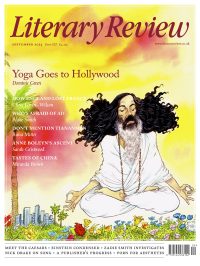Rupert Christiansen
Toneless Wonders
Schoenberg: Why He Matters
By Harvey Sachs
Liveright 256pp £22.99
I’ve felt a little guilty about Arnold Schoenberg all my adult life. If, as a pretentious teenager, I was claiming to be a serious music lover, shouldn’t I have been getting more out of his most ‘advanced’ works? It’s all very well having developed in my later years some faint understanding of the aesthetic manifesto he espoused – the need to replace a corrupted and exhausted system of tonality with the pure laws of the twelve-note ‘serial’ scale – but why could I never draw any joy or pleasure, or indeed anything much at all, from the sounds that resulted? Other high points of 20th-century art – abstract expressionism, Finnegans Wake – had certain attractive qualities (gorgeous colours, wit and wordplay). But Schoenberg’s complex, exigent chamber symphonies, quartets and variations exuded no immediate charm. They seemed to defy you to like them.
Yet one felt compelled to listen. An elite of ferocious intellectuals led by Pierre Boulez was insisting until the 1990s that Schoenberg’s was the only way: he was John the Baptist, heralding music’s future. Anything new that clung to chromaticism was inauthentic, retrogressive kitsch. We were commanded to re-educate our ears and rethink our conception of harmony. Music wasn’t for fun.
But the public would not have it. This was not so much a new order as a shrieking dissonant muddle. It was box-office poison and the Boulezians were ultimately routed by market forces. Over the last three decades, Schoenberg’s status as classical music’s dominating superego has inexorably declined. More

Sign Up to our newsletter
Receive free articles, highlights from the archive, news, details of prizes, and much more.@Lit_Review
Follow Literary Review on Twitter
Twitter Feed
Russia’s recent efforts to destabilise the Baltic states have increased enthusiasm for the EU in these places. With Euroscepticism growing in countries like France and Germany, @owenmatth wonders whether Europe’s salvation will come from its periphery.
Owen Matthews - Sea of Troubles
Owen Matthews: Sea of Troubles - Baltic: The Future of Europe by Oliver Moody
literaryreview.co.uk
Many laptop workers will find Vincenzo Latronico’s PERFECTION sends shivers of uncomfortable recognition down their spine. I wrote about why for @Lit_Review
https://literaryreview.co.uk/hashtag-living
An insightful review by @DanielB89913888 of In Covid’s Wake (Macedo & Lee, @PrincetonUPress).
Paraphrasing: left-leaning authors critique the Covid response using right-wing arguments. A fascinating read.
via @Lit_Review